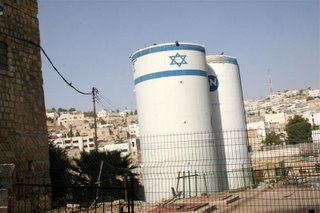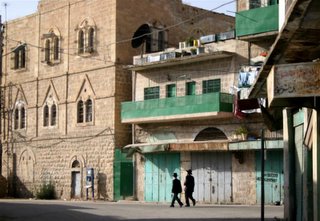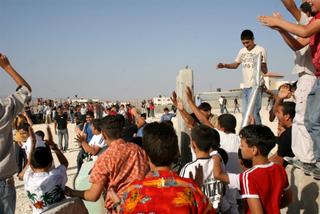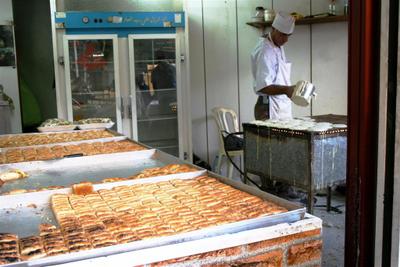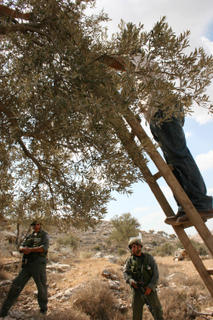
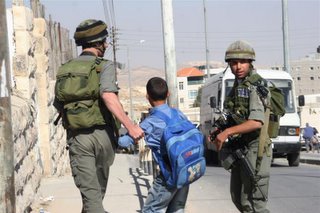
(c) Anne Paq
Dimanche 30 octobre, 2005.
Je me souviendrai longtemps de cette image : cette femme palestinienne courant après une jeep militaire israélienne qui amène son fils vers une destination inconnue. Le garçon apeuré dans la jeep a 8 ans, il s’appelle Saïd et habite le village de Anata.
Aujourd’hui je suis retournée à Anata pour visiter l’école des garçons. Il y a trois semaines, une manifestation avait ete organisee afin de protester contre le projet de construction du Mur devant l’école. Anata est pourtant situé aux confins de la localité de Jérusalem. Ses habitants dépendent de Jérusalem pour tout ce qui est services, soins médicaux, travail. L’érection du Mur, qui vise surtout à protéger la colonie située sur la colline d’en face ; représente donc une catastrophe pour eux.
Désormais un Mur se dresse au milieu de la cour de l’école, non seulement bouchant la vue mais réduisant considérablement l’espace de jeu pour les 800 élèves de l’école. Le Mur est impressionnant, avec une hauteur de plus de 9 metres. Que peuvent ressentir les eleves Palestiniens qui jouent dans son ombre ? Un des membres du personnel de l’école m’indique que les heurts sont pratiquement quotidiens entre les élèves et les soldats. En effet quand je sors de l’école, je vois des enfants jeter des pierres en direction du site de construction du mur et tout à coup se mettre à courir. Puis tout s’accélère, des soldats surgissent dans mon dos, et attrapent un des enfants. Je suis interloquée et essaye de les suivre en photographiant et en leur criant qu’il s’agit d’un enfant. Le jeune garçon est effrayé et se met à pleurer. Quelques habitants accourent, les soldats font alors passer l’enfant derrière un mur et l’emmène sur la site de la construction du Mur. Quelques Palestiniens les suivent et essayent de convaincre les soldats de relâcher l’enfant. Les soldats font mine de ne pas parler anglais pour ne pas me donner d’explication. La mere de l’enfant les implore. Rien n’y fait. La jeep militaire est parti. Je ne sais pas ce qu’il va advenir de cet enfant. Il y a en ce moment plus de 300 enfants incarcérés dans les prisons israéliennes. Ils peuvent être condamnés pour des années pour avoir jeter des pierres. Aurais-je dû davantage insister auprès des soldats ? Ce soir, j’ai la nausée soir en repensant au visage apeuré de Said, à sa mère derrière la jeep et à mon impuissance.
Ps : Le soir, la famille nous a confirmé que le garçon avait été relâché après plusieurs heures. Il était encore sous le choc. Le père a dû signé un papier indiquant que, la prochaine fois, il devra payer une amende de 20,000 shekels ( environ 4000 euros).
ENGLISH
Sunday, 30 October
I will remember for a long time this image: a Palestinian woman who runs after an Israeli military jeep that takes away her son. His name is Said, he is 8 years old and lives in Anata.
Today I went back to Anata to visit the boys’ school. I went there three weeks ago for a demonstration against the project of the construction of the Wall in front of the school. Three weeks later I heard that the Wall has been built, just in the middle of the school’s yard, leaving just very little space for the 800 children to play. The Wall is massive, over 9 meters there. What can the children feel when they play in the shadow of it? One member of the school told me that the soldiers almost come everyday, thus provoking clashes with the children. As a matter of fact, as I walked outside the school I saw some children throwing stones at the soldiers standing at the construction site of the Wall. Then everything went very fast. The children started to run and two soldiers suddenly appeared and caught the first boy they could. I did not really what to do, I tried to take some pictures and shouted at them that he was only a child but they did not care. Some Palestinians quickly came to protest but then the soldiers carried away the crying boy to the site of the construction of the Wall. Again, some Palestinians followed and tried to convince the soldiers to release him. But there was no way; they drove away while his desperate mother was running behind it. I do not know what will happen to that boy. Some over 300 children are currently in Israeli jails and some of them were convicted for years to have thrown stones. Should have I shouted louder? Thinking about the face of the frightened boy, her mother running behind the jeep, and my powerlessness, I feel sick tonight, and angry.
Ps: tonight we could talk to the family, the boy was returned to his home, after having been detained several hours. He was still shattered and frigthened. The army made the father signed a paper. Next time, he will have a pay a fine of 20,000 shekels (around 5,000 dollars).
